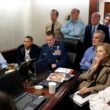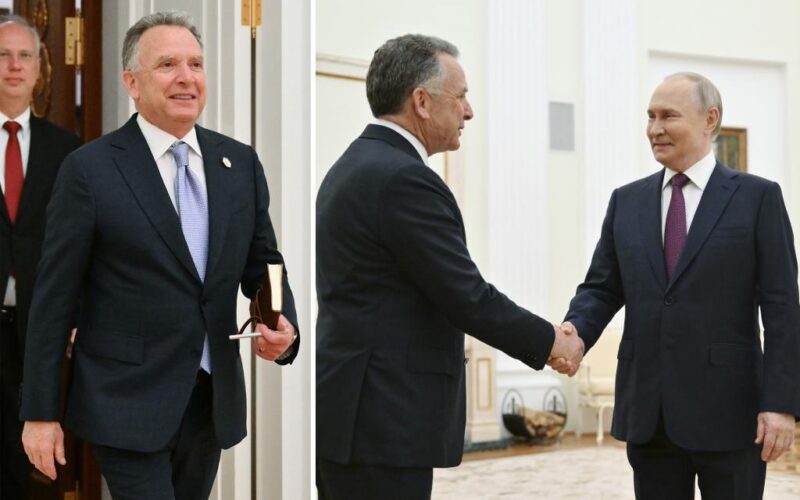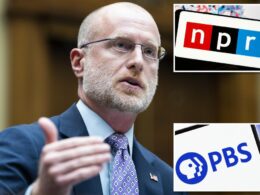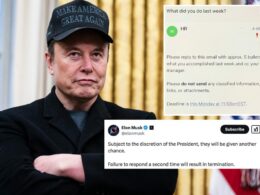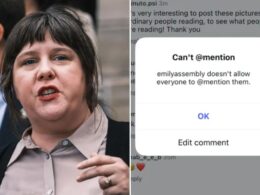WASHINGTON — President Trump’s special envoy to the Middle East, former real estate attorney and investor Steve Witkoff, has left administration insiders distressed by his approach to negotiating with two of America’s greatest adversaries.
Witkoff, who has become Trump’s de facto personal ambassador to Russian President Vladimir Putin in addition to taking on the Middle East portfolio, takes part in high-level meetings alone — and is said to have even occasionally leaned on Kremlin translators — in a break with longstanding diplomatic procedure, multiple sources told The Post.
Ahead of Witkoff’s most recent meeting with Putin this past Friday, the New York native greeted the Kremlin tyrant like an old friend — with no sign of the usual coterie of advisers, experts and military officers who typically accompany US officials conducting negotiations.
Putin himself did not attend Friday’s meeting solo, but was instead accompanied by aide Yury Ushakov and the head of Moscow’s sovereign wealth fund, Kirill Dmitriev.
“Anybody engaging in these kinds of talks with Putin would benefit from having experienced Russia hands on his or her team and bringing them along to meetings with the Kremlin,” John Hardie, director of the Foundation for Defense of Democracy’s Russia program said of Witkoff’s move.
A member of Trump’s first administration was more succinct.
“Nice guy, but a bumbling f–king idiot,” this person said of Witkoff. “He should not be doing this alone.”
‘Maybe that’s just me getting duped’
Heralded by his allies as a fierce negotiator, Witkoff would appear to have plenty on his plate without getting involved in Europe’s worst conflict since World War II.
In his role as Middle East special envoy, Witkoff has tried to negotiate a cease-fire and hostage release deal between Israel and Hamas, as well as a revised agreement with Iran over its nuclear weapons program.
Witkoff’s tenure got off on the right foot after he helped broker a two-month pause in fighting between Israel and Hamas that took effect the day before Trump was sworn in.
But the envoy’s attempt to extend the cease-fire went badly.
On March 12, Witkoff left meetings with Hamas representatives in Qatar believing he had a deal in principle. The cease-fire would be extended by another month, with the terror group releasing five living hostages in exchange for a larger number of Palestinian prisoners.
Two days later, Hamas countered: It would release one living US hostage taken in the Oct. 7, 2023, attack, along with the bodies of four others. Witkoff turned down the offer out of hand and the cease-fire collapsed four days later.
“I thought we had an acceptable deal,” a befuddled-sounding Witkoff told “Fox News Sunday” March 23. “I even thought we had an approval from Hamas. Maybe that’s just me getting duped. I thought we were there, and evidently we weren’t.”
While many Israelis appreciate Witkoff’s efforts, his lack of diplomatic experience is seen as clouding his judgement.
“His assumption that actors like Hamas or Iran are primarily motivated by a desire to live — and can therefore be reasoned with through direct engagement — reflects a dangerous misunderstanding of their long-term ideological goals,” said Shiri Fein-Grossman, the former Head of Regional Affairs at the Israel National Security Council said.
“We have to understand our enemies through their lens, not ours. Hamas and Iran are autocratic regimes driven by deep-rooted ideologies, not short-term interests.”
Others fear Witkoff is being asked to take on too large of a role.
“How does Witkoff divide his time with two very demanding negotiations?” asked Israeli security expert and Tel Aviv-based Institute for National Security Studies fellow Danny Citrinowicz. “I think he’s a good guy, but the Iran issue is so complex that I’m hoping he is bringing more people to the team.”
“Because as of now the Iranians might have the upper hand, given their vast knowledge in negotiations.”
Who’s in charge?
When Trump took office Jan. 20, he already had a special envoy for the Russia-Ukraine war: Retired Army Lt. Gen Keith Kellogg, an adviser to then-VP Mike Pence during Trump’s first term.
But in mid-March, Kellogg’s job title was changed to “special envoy for Ukraine” from “special envoy for Ukraine and Russia.”
Witkoff, meanwhile, was named an ambassador-at-large and given authority to negotiate an end to the Ukraine war with Moscow — but not Kyiv, which remained Kellogg’s purview.
Kellogg’s work has been fruitful, getting Kyiv to sign on to a proposed cease-fire and hammering out an expected-to-be inked mineral rights deal with the Trump administration.
But having separate negotiators for each side is proving difficult to balance.
On April 24, Ukrainian President Volodymyr Zelensky said he, Kellogg and a European delegation had reached an acceptable peace proposal during talks in London before Trump announced a new arrangement that would recognize Crimea as Russian — which Moscow insists upon and Kyiv views as a red line.
“A challenge with the way President Trump split responsibilities between Witkoff and Kellogg,” Hardie said, “is that Witkoff, who is closer to Trump, relays the Kremlin’s view to Trump but has much more limited exposure to Kyiv’s views.”
“If Trump finally got serious about mediating an end to the war in Ukraine, he would appoint one person to talk to both sides — shuttle diplomacy — and preferably someone with some experience in diplomacy,” former US Ambassador to Russia Michael McFaul posted to X on Saturday. “Witkoff acts as a mailman for Putin. He is not negotiating anything.”
Making matters worse, Russian media has picked up on a pattern of Witkoff parroting Putin, with state television announcers recently commenting that the American easily accepts Moscow’s narratives — even when Russians don’t.
The most egregious example came during a March 21 interview with Tucker Carlson, when Witkoff repeated Kremlin talking points that “the largest issue” in negotiations was “political” and related to Moscow’s annexing of “these so-called four regions” — while forgetting the names of the eastern oblasts at stake (Donetsk, Kherson, Luhansk and Zaporizhzhia).
“They’re Russian-speaking,” Witkoff said, repeating a common excuse Putin gives to justify his assault on Ukraine. “There have been referendums where the overwhelming majority of the people have indicated that they want to be under Russian rule.”
But the envoy failed to acknowledge that Moscow either killed or drove out Ukrainian-language speakers, or ordered them to only communicate in Russian — which The Post and other outlets have confirmed on the ground — and that the referenda were conducted under the watchful eye of armed Kremlin troops.
“The Russians are de facto in control of these territories,” Witkoff said. “The question is will they be, will the world acknowledge that those are Russian territories? Will Zelensky survive politically if he acknowledges this? This is the central issue in the conflict. Absolutely.”
Ukrainian officials rebuked those claims, with one telling The Post: “This is about sovereignty and dignity; not politics.”
“I believe Mr. Witkoff has adopted the strategy of the Russian side,” Zelensky told reporters on April 17. “Consciously or not, he is spreading Russian narratives. Either way, it does not help.”
Others have criticized Witkoff’s habit of not knowing his interpreters in discussions with Putin. In video from his Friday meeting, Witkoff is heard asking if the one person sitting on his side of the table was “from the embassy.”
“It is IMPOSSIBLE to have negotiations when you do not trust the translator. Witkoff does not speak Russian, and he cannot verify what is being translated,” Ukrainian-Estonian translator and government advisor Jaanika Merilo said on X. “It is crucial that every nuance is translated correctly and in the context.”
“No politician goes to negotiations to hostile environment, what Russia is supposed to be, without his own translator. You do, if you really trust the other party. Or unless you are not competent. Unless you don’t care. Beats me but something is off.”
Iran confusion
Negotiating a nuclear agreement with Iran should in theory be the easiest of Witkoff’s jobs. Longtime Middle East observers say the Tehran theocracy is at its weakest-ever point following more than two years of proxy war with Israel and widespread internal opposition.
The State Department has insisted the US position is that Tehran completely dismantle its nuclear and uranium enrichment programs. But so far, Iran has stubbornly resisted — refusing US demands to end uranium enrichment and close its nuclear facilities.
Earlier this month, fresh off indirect talks held in Oman, Witkoff floated allowing Iran to keep its facilities if it promises to keep uranium enrichment levels lower than what’s needed for weapons in a plan that mirrors former President Obama’s nuclear deal that Trump canceled during his first term in office.
“You do not need to run, as they claim, a ‘civil nuclear program’ where you’re enriching past 3.67%,” Witkoff told Fox News host Sean Hannity April 14, “so this is going to be much about verification on the enrichment program.”
Witkoff walked back his comments a day later, saying that “any final arrangement must set a framework for peace, stability, and prosperity in the Middle East — meaning that Iran must stop and eliminate its nuclear enrichment and weaponization program.”
“I think one of the worst cases if he does reach a deal is that something emerges like a rollback of the program that isn’t permanent,” FDD research fellow Andrea Stricker said on a recent press call. “On a technical level, Iran may say that it’s permanent, but in effect, it would retain all its enrichment infrastructure to wait out the Trump administration and bust out of the restrictions.”
“They really need to be put in a position of seeing the nuclear program as is a threat to their survival, rather than something that protects their survival,” Stricker said.
Former Trump National Security Advisor John Bolton was more blunt, posting on X Sunday that “Witkoff’s discussions with Iran are a waste of oxygen.”
“The Iranians are trying to buy time and relief from economic sanctions so they can rebuild their military. We cannot just ‘tap along’ with the Iranians,” he said, referencing the president’s recent concern that Moscow is “tapping” him along with prolonged talks.
“Trump is making the same mistakes Obama did in 2015,” Bolton added.
Tehran has every reason to drag out the nuclear talks if Witkoff and Trump allow, according to FDD senior fellow Behnam Ben Taleblu, as they believe that “so long as Washington is talking, Jerusalem is not shooting — and through that prism everything else flows.”
“The foremost element of Tehran’s diplomatic strategy today is not to earn sanctions relief …” he added. “The foremost strategy is to use direct engagement with the United States as a literal human shield against an Israeli preemptive attack against Iran’s nuclear and/or military installations.”
Meanwhile, people familiar with the situation say Israel is waiting in the wings to conduct a strike on Iran’s nuclear facilities, quietly suggesting it could do so without US military support.
“It is a badge of honor to be the target of a John Bolton tantrum,” White House deputy press secretary Anna Kelly told The Post in a statement following publication. “He and his fellow warmongers quoted in this so called ‘news piece’ thrive off forever war – lining their pockets while young people die.
“Steve Witkoff has done incredible work securing the release of Americans detained abroad, like Marc Fogel, while leaving behind a massive business enterprise to serve his country. Like President Trump, he is focused on stopping the killing and advancing peace through strength.”



